Who is this guide for?
This guide is for you if you are:
- A student looking for their first job; and/or
- A student with no experience; and/or
- A student looking for a part time job
- A high school or A-level student looking for work
- A graduate student
This guide sets out how you can write a CV even if you have little or no work experience. In addition, it provides links to our various free student CV templates, with an example of a good CV for students to use.
How is this guide different?
Surfing the web doesn’t throw up many good CV samples for students. Many guides on how to write a CV are written for those who have been in the workplace for some time.
This guide is written for students who may have little or no work experience to put on their CV. It explains section-by-section how to create the correct CV format for students and what should go in a student CV.
Section-by-section guide to your student CV
(1) Personal contact information
Your personal contact information typically goes at the top of your CV.
This should include:
- First name and last name
- Address
- Email (make sure there’s nothing unprofessional about this – e.g. don’t use dannylikesicecream@hotmail.com)
- Phone number(s)
- Driving license status if relevant to the job – e.g. ‘Full clean driving license’
This should not include (unless highly relevant to the job):
- Age
- Disabilities
- Gender reassignment
- Marital status / civil partnership
- Pregnancy or the fact you recently had a baby
- Race
- Religion or belief
- Gender
- Sexual orientation
The only time these protected characteristics should be mentioned is if they are directly relevant to the job (for example, working in a women’s refuge).
EXAMPLE CONTACT DETAILS FOR A STUDENT:

(2) Personal statement
There are lots of names used for the personal statement – you might hear it referred to as a:
- profile
- personal profile
- career objective
- objective
- summary
- introduction
- or some combination of these words!
However, whatever you want to call it, it always has the same function.
It is a concise paragraph of around 2 to 4 lines which should explain:
- Who you are
- Why you are the perfect candidate for this job (clues in the job advert!)
- What you’re looking for
EXAMPLE PERSONAL STATEMENT FOR A STUDENT:

To write this section:
- Start off with a line introducing yourself and giving a couple of great points about you (as relevant to the workplace/job as possible).
- Read the job advert carefully and summarise which of the most important parts you meet (1 – 2 sentences).
- Briefly explain what you’re looking for (e.g. a full time job, a part time job, casual work, a Saturday or weekend job etc).
Take care with point 3. If for example you’d consider working Saturday or Sunday for the right job but you prefer Saturday, put down Saturday/Sunday. Otherwise, by limiting what you say, you may miss out on some great opportunities.
(3) Skills
As a student, it’s likely you’ll have little or no work experience. Therefore, the skills section should appear higher up on your CV than would normally be the case. It’s quite typical to find this section below the personal statement for students.
To complete this section successfully, you need to look again at the job advert:
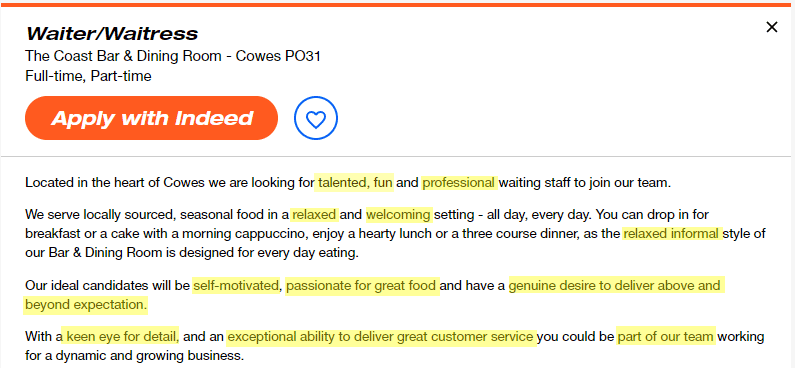
Note the highlighted words above. For this particular role, all of the skills required are ‘soft skills’.
Whilst hard skills are very defined and specific (such as typing speed or the ability to use a certain software package), soft skills are less measurable, but no less important. You’ll see a range of soft skills above including:
- Professionalism
- Self-motivated
- Passion for great food
- Desire to deliver above and beyond expectations
- Keen eye for detail
- Exceptional ability to deliver great customer service
- Teamwork
- Ensuring the customer is relaxed and feels at ease (for example, by being friendly and having a good rapport)
This section looks best with a bullet point list. However, what you shouldn’t do is simply list all of the skills that you found in the job advert on your CV. An employer will not simply take you at your word. Instead, you need to give evidence of how you have the skills that the employer is looking for.
Giving evidence for soft skills:
- Consider when, in the past few years, there have been times where you used the skills that the employer is looking for to affect something positively. For example, this might be as part of a school project, preparing for an essay or dissertation, or creating and delivering a presentation. Give examples.
- If you’ve led or taken part in a team at school – a band, sports team or technology team for example, use examples of where you’ve demonstrated the skills as part of your participation.
- If you’ve taken part in a martial arts class, chances are you’ll have developed a lot of soft skills that you can talk about, alongside your achievements. Martial arts teach self-discipline, concentration, focus and coordination amongst other things. In addition, some dojos offer their students the opportunity to assist in teaching a class which can help develop communication, work ethic, leadership, personal responsibility and listening.
- If you’ve been given other responsibilities outside of school, consider whether these demonstrated soft skills.
Improving employability:
- If you’re short on skills and struggling to get an interview, consider volunteering for a whole. This is a great way to gain and develop soft skills and to have something to put on your student CV. In addition, it shows prospective employers you have experience of working in a business environment.
- Participating in community projects is another way you can develop and demonstrate soft skills.
Here’s a great video from Don Georgevich, the founder of JobInterviewTools.com, which further explains how skills can be demonstrated on your CV:
EXAMPLE SKILLS SECTION FOR A STUDENT:
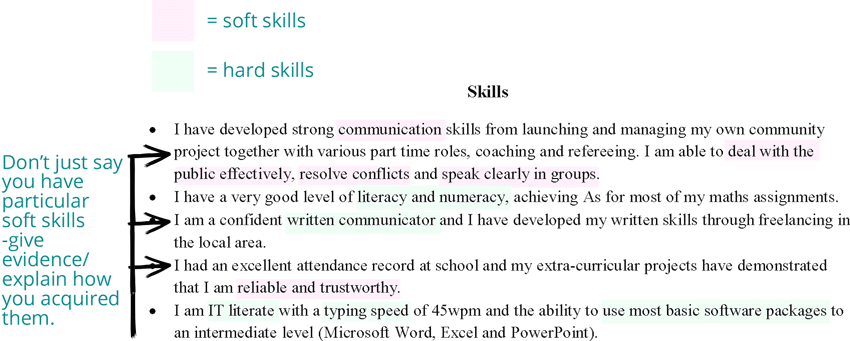
(4) Work experience
Many students have very little or no formal work experience at all. For jobs where an employer anticipates applications from students, they will not expect to see much work experience. However, including non-traditional work experience can give you an advantage over other candidates.
This might include:
- Casual work such as regular babysitting, dog walking, gardening and car washing (you can make these sound more impressive if you explain how you fitted these around your other commitments and/or generated a good wage from them)
- Volunteering at a charity shop, country park or local institution.
- Organising a project in the local community.
- Freelancing – if you have specific hard skills such as programming, graphic design or writing, freelancing is a good way to build these into work experience you can give on your CV. Try sites such as People Per Hour and Fiverr to gain some experience.
- Blogging for a local business or newspaper.
- Helping in the family business.
- Helping at local events (stewards, marshals, health and safety team, clean up)
EXAMPLE EXPERIENCE SECTION FOR A STUDENT:
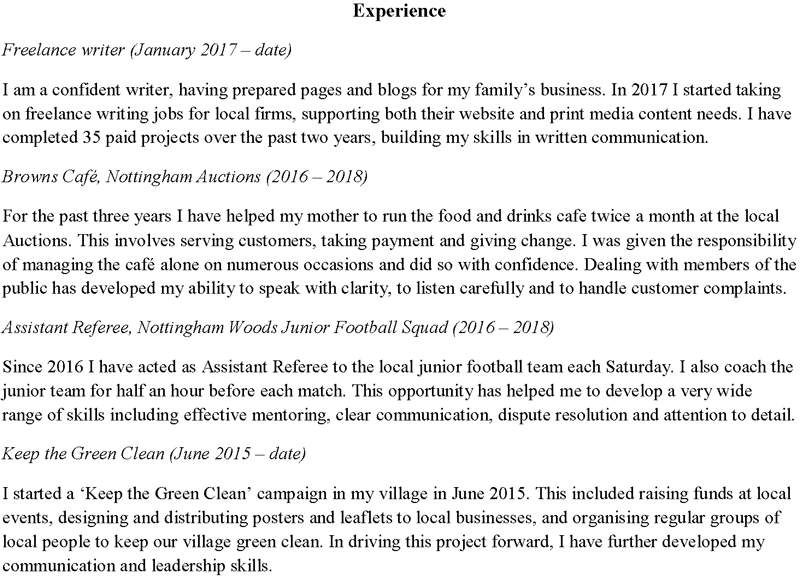
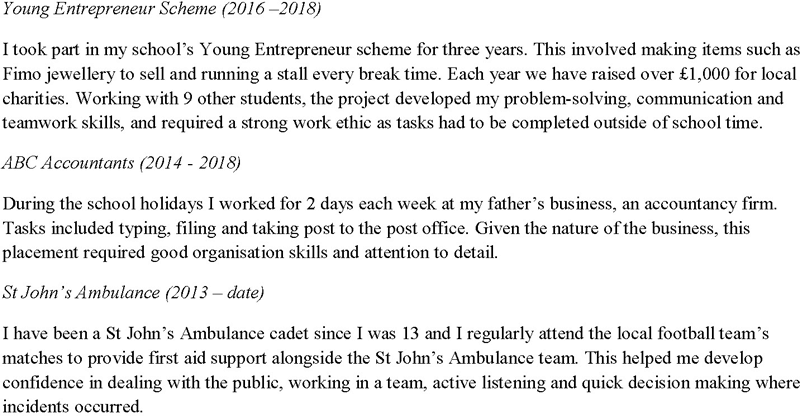
(5) Education
Because students have less or no work experience to include, they need to make the most of their education section.
First and foremost, highlight parts of your education (and grades) which are mandatory to apply for the role, or may be of interest to the employer.
Next, take another look at the job advert and consider the soft skills that the employer wants. If the job advert doesn’t contain a lot of detail, have a look at the Job Profiles on Prospects which will give you a better idea of what’s required.
Now consider how you’ve used those soft skills during your education. For example:
- Written communication – e.g. essays, dissertations, coursework or student journalism, and corresponding with your tutors and supervisors – together with other students for project work.
- Verbal communication – e.g. presentations, involvement in performance arts, or participating in debate teams.
- Teamwork – e.g. working with a group of students on a academic project or involvement with groups
- Time management – e.g. meeting deadlines for essays and dissertations, involvement in extra-curricular activities while studying or have a part-time job which requires division of your time between multiple things.
- Problem solving / critical thinking – e.g. when faced with difficult academic problems, carrying out research / finding innovative solutions, showing initiative, thinking outside of the box.
- Dealing with constructive criticism and learning – during your studies you will have received plenty of constructive criticism. Showing how you too this on board and improved your work can demonstrate to employers that you’re willing to listen and learn.
Providing examples of how you acquired and used these skills during your education can strengthen your application.
EXAMPLE EDUCATION SECTION FOR A STUDENT (SIMPLE):
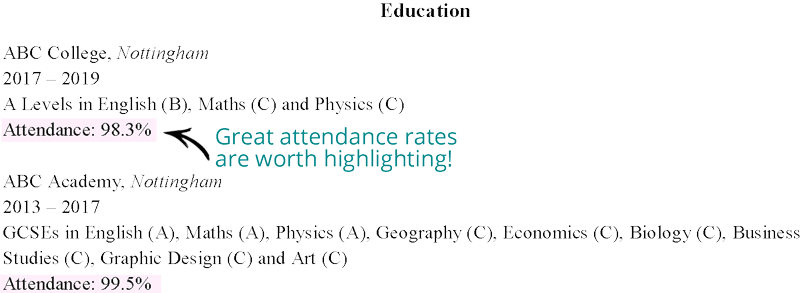
EXAMPLE EDUCATION SECTION FOR A STUDENT (MORE DETAILED):
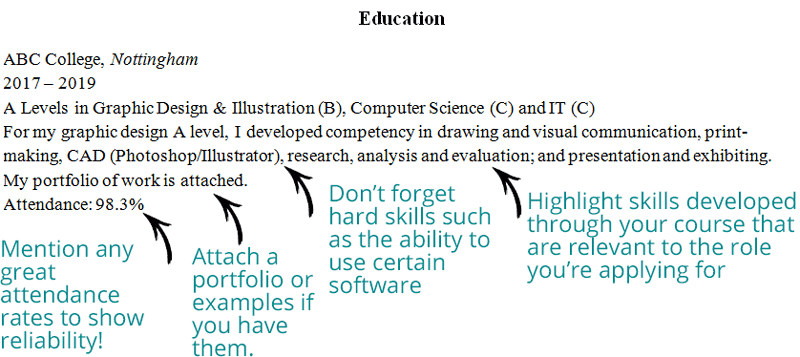
Here are some examples of the additional information you could include in your education section to demonstrate the soft skills an employer is looking for. Remember to focus on any skills the employer has specifically requested, or those that are common for the role you’re applying to (as identified on Prospect’s job profiles).
“While studying for my degree, I was a member of the award-winning Bath University Debating Society. I was involved with everything from weekly meetings to big public debates and competitions, which developed my persuasive communication, my ability to present and my public speaking skills.”
“My dissertation was on the topic of Nursing in a Community Care context. I found myself struggling with this topic after spending some months researching and drafting material, and sought the assistance of my supervisor. He identified that the topic was too broad and therefore there was too much material. Although it meant a substantial rewrite, I took on board his constructive feedback and narrowed the topic. Subsequently my dissertation was awarded a Distinction.”
(6) Hobbies and interests
You don’t have to include a hobbies and interests section but leaving this out is a missed opportunity. This is because it can add substantial value and credibility to a student’s CV, if used properly.
Students have a well-deserved reputation of enjoying a party, so this section can help dispel those preconceptions. In addition, you can point out to prospective employers how your hobbies have helped you further develop valuable soft skills.
For each hobby, ask yourself:
- What soft skills would you need in order to partake?
- Do you have to communicate with people in order to achieve success – like scoring a goal in football or a try in rugby?
- Why did you get chosen as the captain of your sports team?
Some examples of great hobbies to include are:
- Sports (communication, hard work, dedication and fitness)
- Music (creative, confidence, and performance)
- Arts and creative hobbies
- Website building (IT skills)
- Captain of sports team (leadership)
- Journalism (writing), and so on.
Don’t simply list the associated soft skill. Instead, explain – e.g.
“I captained my university football team between 2017 and 2018, which developed my ability to lead and mentor others, and to help them to improve.”
If you attained a particular achievement or award for your hobbies, be sure to mention this!
(7) References
Employers in the UK expect you to include two references on your CV. Appropriate people to include are:
- If you have worked or volunteered, your supervisor
- Your current tutor/supervisor or head of house
- If you’re involved in a sports team, school band, debating team, school project etc, the adult organiser / manager
Work down this list – i.e. you should always include your most recent employer if you have already had a job.
References should include:
- Name
- Address (use school / work address where relevant)
- Phone number.
Always ask the person first to ensure they are happy to provide the reference! Find out more: How to write references in a CV.
Example Student CV
Here’s a complete example of a student CV template:

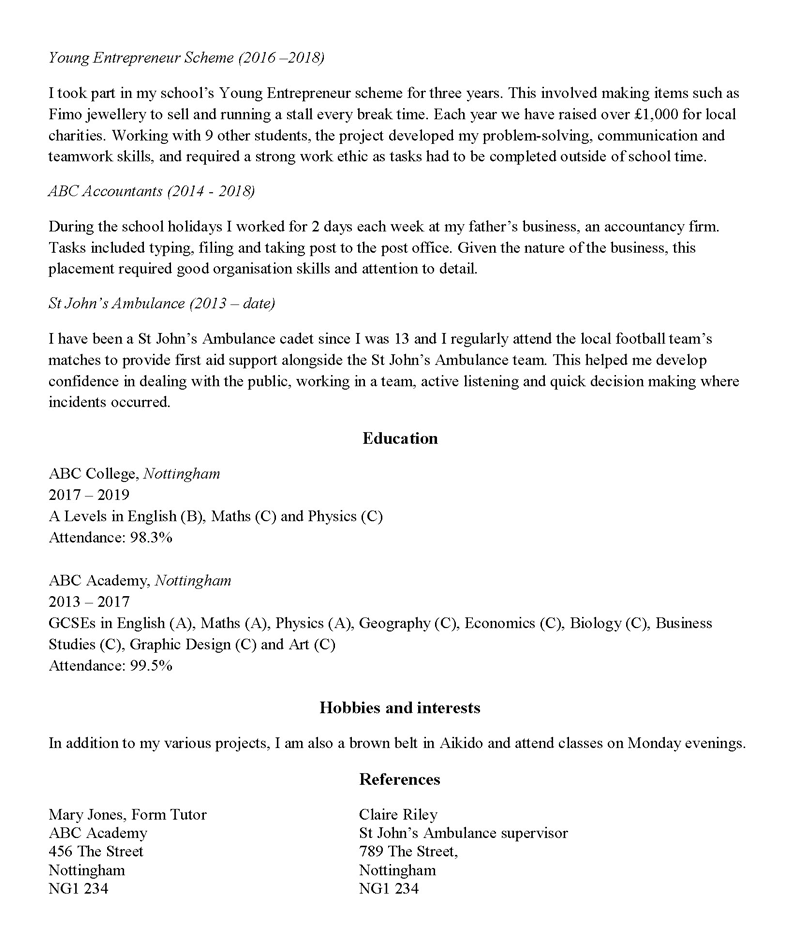
Free student CV template downloads
You can download the above student CV template on this page.
Here are some other helpful templates and examples for students writing a CV:

This guide has been SO helpful to me, thanks.
This helped so much!